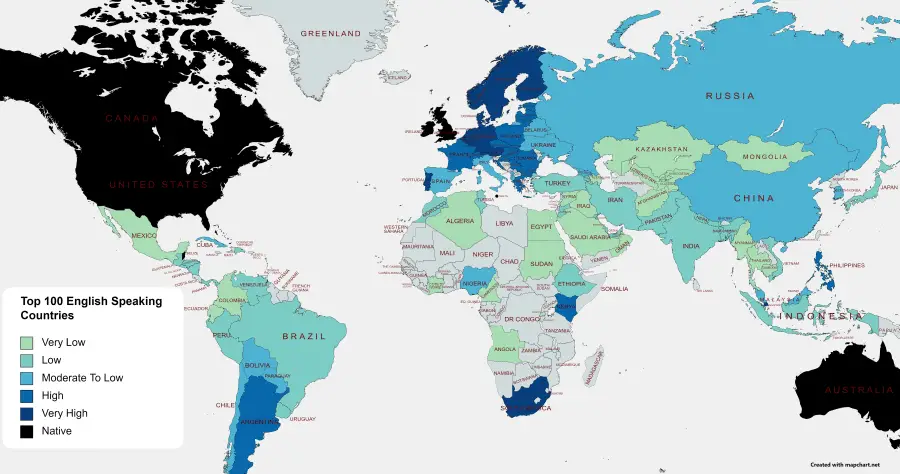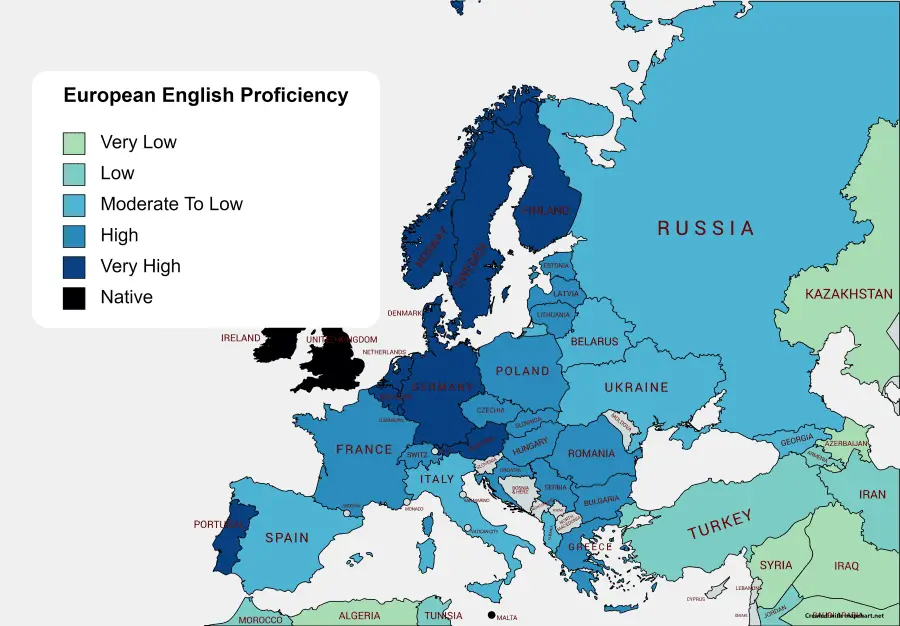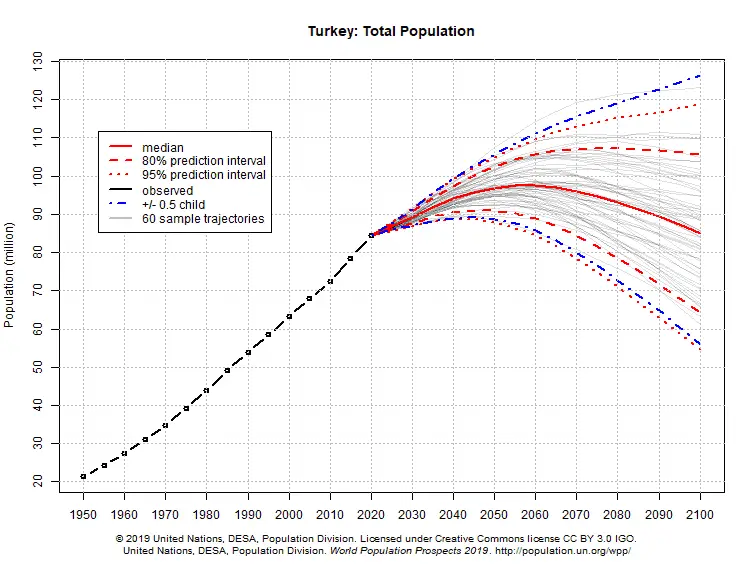Many Europeans may mistakenly believe that the majority of the people of Turkey can easily converse in English, German, or French. Though this can be true for tourist areas at least on a basic level, what about the state of languages in the country as a whole? For instance, how widely spoken is English in Turkey?
Spoken English is not common in Turkey in general. About 17% of Turkey speaks English as a second language. This may seem higher in tourist areas, but according to the English Proficiency Index, Turkey in 2020 was 69th out of the top 100 English speaking countries in the world.
The costal regions of Turkey have become a hot tourist destination especially for Europeans which has led many of those in the hospitality and travel industries to become conversationally fluent on topics related to their field in some of the major European languages. This includes English. But what about the country as a whole? Let’s dive into what may seem to be contradictory evidence about the Turkish and the English language.

Contents
- 1 English In Turkey Compared To Other Countries
- 2 Will I Be Able To Get Around With Only English In Turkey?
- 3 How Many People Speak English In Turkey?
- 4 Where In Turkey Is English Commonly Spoken?
- 5 Languages Spoken In Turkey
- 6 Do They Learn English As A Second Language In Turkey?
- 7 Why Don’t The Turkish Commonly Speak English?
- 8 Final Talking Point: How Common Is English In Turkey?
English In Turkey Compared To Other Countries
The English Proficiency Index (EPI), a project of Education First rates all of the countries of the world with measurable levels of English language speakers and ranks them in a top 100 list. Turkey does make it onto this list each year, but it ranks near the bottom quarter even though it is situated geographically near the largest populations of English second language learners in the world.
How does this stack up against the English language speaker numbers in other countries? What we find is a lower level than many countries, but higher than some.
English In Turkey vs The World

When compared the the rest of the world Turkey is considered low in its population of English language speakers. It ranks as 69th in 2020 on out of the top 100 countries with English speaks in their populations. This is 18 spots behind Armenia and 8 places after Pakistan.
This may be surprising to some, seeing as it is located at the southeast corner of Europe. Yet, much more plays into a country’s propensity to speak foreign languages. In Turkey’s defense, there are many places around the world that have the same level or much worse in terms of English speaker numbers.
Turkey is a country with a population that is proud of its history. It has a checkered past like nearly every country in the world, but its people are happy to be who the are and where they are from.
Like countries like Japan and Italy, they tend to not think that being highly skilled in the languages of foreign nations is an important enough goal. They are content with their own language and culture.
English In Turkey vs Europe

How does Turkey stack up with the English levels of countries in one of the most English friendly areas of the world: Europe? It is a different picture when we move from comparing Turkey to the world and focus primarily on Europe.
The levels of of English in Turkey when compared to Europe is fairly poor. Out of the 34 European countries that make the top 100 list for numbers of English speakers, Turkey is second to last. That means they are number 33 out of 34 with only Azerbaijan lower on the list.
For a country that is wishing to be included in the EU, recognized on the international higher education stage, and compete in the world economically, this is a bad showing. It is something they are working on in the government and education systems, but they have a ways to go.
Will I Be Able To Get Around With Only English In Turkey?
Here we touch directly on an point that may seem to stand in opposition to what the data suggests. Many that travel to, work in, or even deal remotely with people in Turkey say that they have very little problem using English in their interactions. Tourists are able to move freely with English.
You will be able to get around and find what you need without much trouble in Turkey just using English. This is surprisingly true even in smaller areas. Living and working there will be different, but for short trips for leisure or business, English works well.
This is not only for the larger cities, but also in the smaller tourist oriented towns in many parts of the country. Why if only a small percentage of the population speaks English is it relatively easy for someone to communicate with Turkish people whether in the country or out?
The issue boils down to the open, helpful, and friendly nature of the Turkish people that many tourists come in contact with. They know enough of the language to point you in the right direction and are seemingly happy to help. If they are not capable of answering your questions, many make it their mission to find you someone who does.
This cannot be said about all countries and its people, but in Turkey this sentiment is very noticeable. To be honest, the southern United States is this way and in some respects so is Japan.
Insider tip:
It is interesting to note that in these two areas, they may help you openly, but you may not want to hear what they say once you are gone.
Only the Turkish can tell you if this is the case in their culture, but it usually is same around the world. People are generally the same across cultures in a general sense. Their way of dealing with others may be different publicly than what they truly feel in private.
Either way, the helpful warm outward nature of the Turkish is apparent.
Case in point:
My husband Mat for a while taught classes to children around the world. He had families in Turkey that took classes from him every week online. Though the English was not on the level that would allow for deep conversations, I could hear entire families holding lengthy back and forths with him completely in understandable English.
He also had a speaking partner in Germany that also spoke English to a good level. Markus noted that when on holiday in Turkey, if his German was not understood he could switch to English and get by just fine.
A lot of it has to do with the subjects you are talking about, but it also has a lot to do with the Turkish seemingly interested in being helpful.
How Many People Speak English In Turkey?
With a growth trend from the 1950s to 2020 reaching the quadruple level, Turkeys population numbers look quite different than they did a generation ago. The total population of Turkey brings it to the position of 17th in the world.
The total number of people living in Turkey in 2020 was 84,339,067 according to UN estimates. This number includes men, women, and children as well as immigrant populations. Since 17% of Turkey can speak English, 14,337,641 English speakers live in Turkey today.
There is more to be said about percentages and where those estimates are located in this country that is seen as a bridge between Europe and Asia.
What Percentage Of Turkey Speaks English?
With over 14 million people that speak English and 75.63% of Turkey’s population living in the major urban areas, what does the percentage distribution of Turkish English speakers look like? It may be telling when wondering why so many don’t have trouble using English in the country with such a low total percentage of English speakers.
Turkey reports 17% of its population can speak English. This equals 14,337,641 English speakers with 75.63% of them living in urban areas. The result is 10,843,558 Turkish living in their major cities that can speak English. These numbers are based on basic English proficiency.
So, what does this mean for your percentage chance of finding an English speaker in cities in Turkey? Using a generalized statistic that the US census bureau does, we can adjust for populations and estimate how likely you are to find an English speaker.
The US Census Bureau states that an urban city is one that has a population of 50,000 or more people. With this in mind, let’s look at some of these major cities in Turkey to see what percentage chance there is in finding English speakers.
| City | Population | Number of English Speakers | Percentage / Ratio |
| Istanbul | 14,025,646 | 1,753,206 | 12.5% / 1 in 8 |
| Ankara | 4,587,558 | 573,445 | 12.5% / 1 in 8 |
| Izmir | 2,847,691 | 355,961 | 12.5% / 1 in 8 |
| Bursa | 1,854,285 | 231,786 | 12.5% / 1 in 8 |
| Adana | 1,563,545 | 195,443 | 12.5% / 1 in 8 |
| Gaziantep | 1,495,050 | 186,881 | 12.5% / 1 in 8 |
| Konya | 1,003,373 | 125,422 | 12.5% / 1 in 8 |
| Antalya | 955,573 | 119,447 | 12.5% / 1 in 8 |
| Kayseri | 911,984 | 113,998 | 12.5% / 1 in 8 |
| Mersin | 842,230 | 105,279 | 12.5% / 1 in 8 |
What about those major tourist areas that are smaller? The same ratio should either hold true or even be slightly higher as in the bigger cities as long as the town is over 50,000 in population. This is due to the industry and location.
For most Turkish urban populations about 12.5% should be able to speak at least basic English. This is 1 in 8 people living larger Turkish cities.
If you are heading into a less populated area, you are less likely to find someone able to speak with you in English. This is understandable as less education and lower tourism numbers will create an environment with less motivation to learn a notoriously difficult language like English for Turkish speakers.
In rural areas around 4.5% or 1 in 20 people you meet will have enough English to help you if you are in need of assistance.
How Widely Spoken Is English In Turkey?
What does this mean for people trying to live, work, or travel in Turkey using English? It is quite different depending on what your intent is. English may be available, but the level is also another consideration.
If your intent is to talk about tourist related topics with employees at restaurants and hotels, or ask directions of an attendant at a museum or attraction, then you will have no trouble. Yet, simple numbers of people able to speak on some level is not the whole story.
A problem arises when something away from those topics comes up or you are trying to do business in the country. Turkish English proficiency levels on an individual basis tend to be rather limited. Anything other than a basic conversation will many times be met with smiles and blank stares.
One of the hurdles for Turkey’s goal of entering the EU is its limited communication abilities of its population. There are other obstacles, but this is one they are trying currently to address.
In a piece published by redawl.net, it is noted that Turkey only recently raise the minimum years of education for children from 8 to 12 years. It was also noted that most Turks aren’t motivated to study English or any other language past rudimentary levels.
So the distribution of English in Turkey puts it firmly in the top 100 countries with English language skills in the world. Yet, these skills tend to be on the lower end of the spectrum.
Want to know more about English in other countries? I recommend some of my other articles…
- How Common Is Spoken English In Germany?
- How Common Is Spoke English In Italy?
- How Common Is Spoken English In Croatia?
- How Common Is Spoken English In Russia?
Where In Turkey Is English Commonly Spoken?
We looked at the most populated cities earlier when looking at the total numbers. Those numbers are estimations of total English language speaker numbers. There are other factors that can raise or lower the English levels in different areas of the city.
Now we will look at some of the major cities and see where in these cities there will be higher levels of English.
Major Cities In Turkey Where English Can Be Found
The landscape and culture of Turkey causes them to have a significantly higher percentage of their population residing in urban areas. As projected by the UN, 55% of the world’s population live in urban settings. They project that if current trends hold this percentage will rise to 68% by 2050.
With over 75% of Turkey’s population living in urban cities, it is instructive to look at some of the largest ones and where English speakers are most likely to be found.
Istanbul
From the underground sea of columns that is the Basilica Cistern put in place by Roman Emperors to Hagia Sophia the Byzantine Catholic Cathedral converted into a mosque, Istanbul (formerly known as Constantinople) is a treasure trove of history for any traveler. All of this tourism and its connections with Europe make English levels high in the city.
Then there is the presence of Istanbul University with its 70,399 students that make any area around the campus more English friendly. As with any country nearly in the world, English in Turkey is linked with higher education, mathematics, and the sciences.
Ankara
The tourist attractions are galore in this Turkey’s capital city. Tourists can be found walking through the cobbled streets of the Citadel Neighborhood which has its origins as a Byzantine fortified area where European craftmanship is still evident. Other places that attract English speaking employees are the Museum of Anatolian Civilizations and the Roman Baths on Çankiri Caddesi.
Ankara University boast 66,796 which brings up the level of English in and around the campus. This is a good place to find them if you are needing or wanting to seek out an English speaker.
Izmir
This town is not only known for a hosting sight to many day trips to cities like Ephesus found in the New Testament, but also for its own unique flare. Tourists and English speaking people employed at restaurants and hotels can be found from the Kemeralti Market to the MaviBahce Shopping Center.
There are also an impressive 70,282 students that attend Dokuz Eylül University. With this size of a student population, it is likely to find English speakers in and around the university.
Bursa
There are plenty of winter and summer destinations that bring English speakers to Bursa. From the ski slopes atop mount Uludag to the 700 year old UNESCO World Heritage Town of Cumalikizik English will be on the lips of many tourists as well as shop and restaurant employees.
Bursa is also home to one of Turkey’s most celebrated public research institutions, Bursa Uludağ University. With its 74,822 students of whom over 5,000 are international, English abounds on its campus and neighboring areas.
Adana
Whether traveling across the worlds oldest operational bridge built in 120-135 AD by the Romans or boating on Seyhan dam’s artificial lake tourists can be found moving all over Turkey’s fifth largest city. Where there are tourists, there you will find at least some level of English.
Çukurova University hosts 50,455 students with many of them open to English and its study. It is a good bet that English can be found around this urban campus.
Smaller Turkish Tourist Areas Where English Is Usable
Like many other countries with coastlines, there are smaller communities that can attract tourists. These areas will have a likelihood of having English speakers in their restaurants, shops, and hotels.
Ephesus
At its time it was home to 250,000 people and was the second largest city at one point in the Roman Empire. Today it is one of the largest, most well preserved, and complete standing Roman cities on the Mediterranean. This is a pilgrimage site for the historian and Christian alike.
Bodrum
This seaside town on the Aegean Sea is a quintessential Turkish Summer tourist destination for Europeans and vacationers the world over. Fine restaurants, sailing, and beaches are a major draw for English speakers from all over the globe.
Languages Spoken In Turkey
There are two main languages spoken in Turkey today. A third that is very popular in the region, but not widely spoken in Turkey is also present. These three languages make up the vast majority of those heard and spoken on a daily basis.
There are three main languages in Turkey with only one being designated as official. Turkish, Kurdish, and Arabic all find a place in the Turkish population. Turkish is the only one of the three that enjoys an official designation and is recognized as the official language of Turkey.
Hearing that there are three main natively spoken languages in Turkey doesn’t do the dominance of the Turkish language justice. There is a great majority in Turkey speaking its official language.
Native Languages In Turkey
| Language | Population of Speakers | Percentage of Speakers |
| Turkish | 71,300,247 | 84.54% |
| Kurdish | 10,095,386 | 11.97% |
| Arabic | 1,163,879 | 1.38% |
Do They Learn English As A Second Language In Turkey?
As we have discussed, English is definitely spoken by some in Turkish cities, universities, and in tourist destinations. It is not native to the region so this would most definitely put it in the second language category.
English is a second language taught and studied in Turkey. It is learned by children and adults for education purposes and business requirements depending on the region. It is spoken on some level by 17% of the population, but the ability to speak and understand ranges wildly.
How are people learning English in Turkey? Mostly it is studied in private instruction, high schools, and universities.
English In Turkey’s Public Schools
Though there is a program of English language instruction in public high schools in Turkey, the focus and level of English taught leaves many students able to understand a bit, but notable to effectively respond.
English like many languages around the world taught at public schools is primarily to past tests and fulfill requirements for college entrance. The goal of communication doesn’t play a huge factor in its study.
English In Turkish Universities
Here the instruction in English is a bit better, but still primarily meant to enable a student to pass exams and get credit for English on applications and to fulfill graduation requirements. It is honestly hard to learn to actually communicate in any language when it is taught and studied this way.
Why Don’t The Turkish Commonly Speak English?
Due to many of the environmental and national causes listed above, many Turkish don’t feel the need to learn English. They are happy with their country and have a strong sense of identity. This is directly connected to the Turkish language.
Though out of necessity many will study English in school or topically to use in their tourist related fields, high proficiency is rare. There are a couple of reasons for this.
- Teachers are not required to produce students that can actively communicate. They simply need to pass a test.
- Due to testing being the focus, many teachers focus too heavily on Grammar.
- Most students don’t start learning until high school, which outside of the most critical times for language learning
For more on these issues and how they are repeated around the world see my article This Is The Best Time To Start Language Learning.
The English language is tough for the average Turkish speaker to learn in a usable way. To overcome such and obstacle, a strong motivation will have to be present. Many in Turkey simply don’t feel the need.
Final Talking Point: How Common Is English In Turkey?
Though the numbers of Turkish that speak English is rather low for the region, in comparison with the rest of the world it is about average. That being said, many report a welcoming and helpful attitude that helps any English only speaker to easily navigate the country without knowing any Turkish.
Turkish is a difficult language for English speakers like English is for Turks. It will take a lot of dedication and motivation to master it. This is the same situation many Turks are confronted with when faced with the decision to truly learn English or not.
Can you get around in Turkey with only English? You usually won’t have a problem, but it has more to do with the people themselves than their command of the English language.
If you would like to read more about how widely spoken English is in other countries read some of my other articles here…

